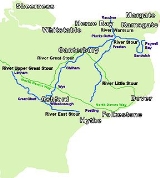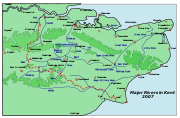
River Little Stour
Encyclopedia

The Little Stour is one of the tributaries
Tributary
A tributary or affluent is a stream or river that flows into a main stem river or a lake. A tributary does not flow directly into a sea or ocean...
of the River Stour
River Stour, Kent
The River Stour is the river in Kent, England that flows into the English Channel at Pegwell Bay. Above Plucks Gutter, where the Little Stour joins it, the river is normally known as the Great Stour. The upper section of the river, above its confluence with the East Stour at Ashford is sometimes...
in the English
England
England is a country that is part of the United Kingdom. It shares land borders with Scotland to the north and Wales to the west; the Irish Sea is to the north west, the Celtic Sea to the south west, with the North Sea to the east and the English Channel to the south separating it from continental...
county of Kent
Kent
Kent is a county in southeast England, and is one of the home counties. It borders East Sussex, Surrey and Greater London and has a defined boundary with Essex in the middle of the Thames Estuary. The ceremonial county boundaries of Kent include the shire county of Kent and the unitary borough of...
. The upper reaches of the river are better known as the Nailbourne, whilst the lower reaches were once known as the Seaton Navigation.
The intermittent source of the river is at Lyminge
Lyminge
Lyminge is a village in southeast Kent, England. It lies about five miles from Folkestone and the Channel Tunnel, on the road passing through the Elham Valley. The Nailbourne stream begins in the village and flows north through the Valley, to become one of the tributary streams of the Great Stour...
, and in its early reaches from Lyminge to Littlebourne
Littlebourne
Littlebourne is a village and civil parish near Canterbury in Kent, South East England.The 13th-century church, St Vincent of Saragossa, is thought to have been founded by the monks of St Augustine's Abbey and contains an ancient wall painting depicting Saint Christopher, patron saint of travellers...
it forms a chalk stream
Chalk stream
Chalk streams have characteristics which set them apart from watercourses associated with other rock types.Aside from those with an interest in the geological and ecological disciplines, the term chalk stream is most widely used among a small group of fly fishermen ,...
and winterbourne
Winterbourne (stream)
A winterbourne is a stream or river that is dry through the summer months. A winterbourne is sometimes simply called a bourne, from the Anglo-Saxon for a stream flowing from a spring, although this term can also be used for all-year water courses....
that is normally known as the Nailbourne. Below Littlebourne the river is better known as the Little Stour, and it joins with the Great Stour
River Stour, Kent
The River Stour is the river in Kent, England that flows into the English Channel at Pegwell Bay. Above Plucks Gutter, where the Little Stour joins it, the river is normally known as the Great Stour. The upper section of the river, above its confluence with the East Stour at Ashford is sometimes...
at Plucks Gutter
Plucks Gutter
Plucks Gutter is a small hamlet in Kent, England where the Little Stour and Great Stour rivers meet. During the Middle Ages, the two rivers met the Wantsum Channel at Stourmouth, but the combined rivers now flow onward to the sea via Sandwich to Pegwell Bay near Ramsgate, leaving Plucks Gutter...
near West Stourmouth.
Nailbourne
The Nailbourne flows from LymingeLyminge
Lyminge is a village in southeast Kent, England. It lies about five miles from Folkestone and the Channel Tunnel, on the road passing through the Elham Valley. The Nailbourne stream begins in the village and flows north through the Valley, to become one of the tributary streams of the Great Stour...
, through the Elham Valley
Elham Valley
The Elham Valley is a chalk valley carved by the River Nailbourne situated in the North Downs in East Kent. The valley is named after the settlement of Elham...
until it becomes known as the Little Stour at Littlebourne
Littlebourne
Littlebourne is a village and civil parish near Canterbury in Kent, South East England.The 13th-century church, St Vincent of Saragossa, is thought to have been founded by the monks of St Augustine's Abbey and contains an ancient wall painting depicting Saint Christopher, patron saint of travellers...
.
The Nailbourne bubbles up beneath St Ethelburga's Well in Tayne Field in the centre of Lyminge. Whilst the stream often holds a plentiful supply of water from Lyminge to Elham
Elham
Elham is a village in East Kent situated approximately south of Canterbury and north east of Folkestone in the Elham Valley.-Toponomy:The origin of the village's name has always been a matter of argument. The village is listed in the Domesday Book of 1086 as Alham. This may have derived from...
throughout the year, it rarely holds any water from Elham to Bishopsbourne even in the winter months. However, in wet years the normally dry ditch can turn into a fast flowing torrent, flooding roads, fields and houses. An example of this was in 2001 when there was extensive flooding throughout the Elham Valley.
There are a number of minor tributaries that flow into the Nailbourne throughout the Elham Valley. Most are nameless although Ordnance Survey maps do mark a stream known as the East Brooke which runs from Etchinghill
Etchinghill, Kent
Etchinghill is a village in Kent, England, about 5 km north of Hythe, and 1 km north of the Channel Tunnel terminal at Cheriton, near Folkestone. The village has a standard golf course noted for its hills, as well as a pub restaurant called The New Inn which claims to be the closest pub...
and joins the Nailbourne at Lyminge.
Little Stour
Below Littlebourne the river is better known as the Little Stour, and it joins with the Great StourRiver Stour, Kent
The River Stour is the river in Kent, England that flows into the English Channel at Pegwell Bay. Above Plucks Gutter, where the Little Stour joins it, the river is normally known as the Great Stour. The upper section of the river, above its confluence with the East Stour at Ashford is sometimes...
at Plucks Gutter
Plucks Gutter
Plucks Gutter is a small hamlet in Kent, England where the Little Stour and Great Stour rivers meet. During the Middle Ages, the two rivers met the Wantsum Channel at Stourmouth, but the combined rivers now flow onward to the sea via Sandwich to Pegwell Bay near Ramsgate, leaving Plucks Gutter...
near West Stourmouth. The merged river is usually known as the River Stour
River Stour, Kent
The River Stour is the river in Kent, England that flows into the English Channel at Pegwell Bay. Above Plucks Gutter, where the Little Stour joins it, the river is normally known as the Great Stour. The upper section of the river, above its confluence with the East Stour at Ashford is sometimes...
.
Settlements
The river flows through the following settlements -- LymingeLymingeLyminge is a village in southeast Kent, England. It lies about five miles from Folkestone and the Channel Tunnel, on the road passing through the Elham Valley. The Nailbourne stream begins in the village and flows north through the Valley, to become one of the tributary streams of the Great Stour...
- ElhamElhamElham is a village in East Kent situated approximately south of Canterbury and north east of Folkestone in the Elham Valley.-Toponomy:The origin of the village's name has always been a matter of argument. The village is listed in the Domesday Book of 1086 as Alham. This may have derived from...
- BarhamBarham, KentBarham is a village and civil parish in the City of Canterbury district of Kent, England. It is situated close to the A2 road between Canterbury and Dover, 7 miles south-east of Canterbury and 7 miles north of Folkestone....
- KingstonKingston, KentKingston is a village and civil parish near Canterbury in Kent, South East England.The village is located 5 miles to the south east of the city centre of Canterbury on the edge of the North Downs in countryside designated as an Area of Outstanding Natural Beauty.The local church, dedicated to Saint...
- BishopsbourneBishopsbourneBishopsbourne is a small village in Kent, England. It lies in the Nailbourne valley some from Canterbury and about from Dover. It has a public house, The Mermaid, built in 1861, and a church, St Mary's, with 14th-century wall paintings. Author Joseph Conrad lived here and his house, "Oswalds",...
- BridgeBridge, KentBridge is a village and civil parish near Canterbury in Kent, South East England.Bridge village is situated in the Nailbourne valley in a rural setting on the old Roman road, Watling Street, formerly the main road between London and Dover...
- PatrixbournePatrixbournePatrixbourne is a small settlement within the civil parish of Bekesbourne-with-Patrixbourne in the Canterbury District of Kent, England. It is located approximately one mile south of Bekesbourne, on the River Nailbourne, a tributary of the Little Stour....
- BekesbourneBekesbourneBekesbourne is a village, within the civil parish of Bekesbourne-with-Patrixbourne, near Canterbury in Kent, South East England.Situated approximately three miles south-east of the city boundary, the village has a church, St Peter's Parish Church which has a Norman doorway, a 13th century chancel...
- LittlebourneLittlebourneLittlebourne is a village and civil parish near Canterbury in Kent, South East England.The 13th-century church, St Vincent of Saragossa, is thought to have been founded by the monks of St Augustine's Abbey and contains an ancient wall painting depicting Saint Christopher, patron saint of travellers...
- WickhambreauxWickhambreauxWickhambreaux is a village, just off the A257 Sandwich Road, five miles from Canterbury in the county of Kent, England, United Kingdom.-History:Wickhambreaux manor was the home of Joan of Kent, wife to Edward Plantagenet, and mother of Richard II...
- IckhamIckhamIckham is a village within the civil parish of Ickham and Well, five miles east of Canterbury in Kent, South East England.The village is centred around a single road with many old and well preserved houses, with the 13th-century Parish Church of St John the Evangelist in the midst...
- West Stourmouth
Water mills
The Little Stour powered four watermills, at Littlebourne, Wickhambreaux and Ickham.Navigation
The stretch of the river downstream from the mills and wharf at Seaton, in the parish of Ickham, was made navigable at some time prior to 1831. As a consequence it was sometimes referred to as the Seaton Navigation.Environment
On 28 September 2007 Environment Secretary, Phil Woolas, announced that the Little Stour would be one of 24 additional sensitive areas in England that have been identified as at risk from excessive nutrients from sewage treatment works. This means that Southern Water will be obliged under the Urban Waste Water Treatment Regulations to take action by 2014 to reduce phosphorus and nitrates in the discharges from their sewage treatment works which discharge into the Little Stour.In early 2007 it was revealed that an application had been made by a company called Newater to discharge treated sewage into the Nailbourne at Elham. The sewage would be piped from the Broomfield Banks treatment works near Dover into the Nailbourne at North Elham with the intention of addressing the water supply deficit in South East England. Whilst the Environment Agency
Environment Agency
The Environment Agency is a British non-departmental public body of the Department for Environment, Food and Rural Affairs and an Assembly Government Sponsored Body of the Welsh Assembly Government that serves England and Wales.-Purpose:...
has given assurance that the scheme is safe the application has raised concerns including those of the Little Stour & Nailbourne River Management Group. The application is one of nine similar applications by Newater PLC in the Southern part of England. The Environment Agency is expected to make a decision on the Nailbourne application later in the year.

